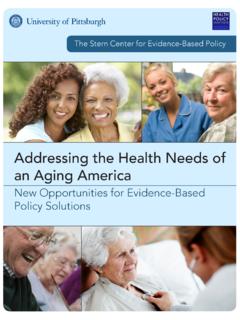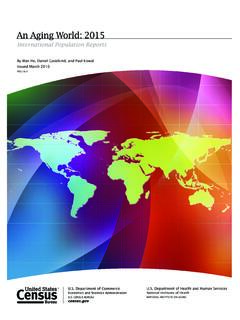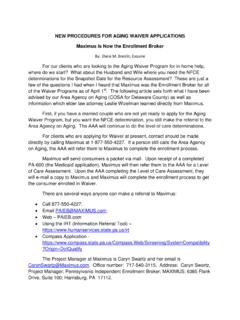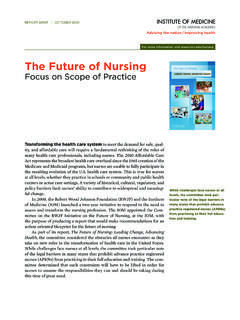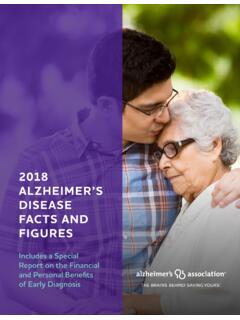Transcription of Addressing the Health Needs of an Aging America
1 The Stern Center for Evidence-Based Policy Addressing the Health Needs of an Aging America New Opportunities for Evidence-Based Policy Solutions Addressing the Health Needs of an Aging America | 1. The Stern Center for Evidence-Based Policy The Stern Center for Evidence-Based Policy ( Stern Center ) fosters, supports, and leads rigor- ous scientific research initiatives that generate actionable, evidence-based Health policy recommen- dations. By leveraging significant advances in evidence-based research methods and collaborating with key stakeholders, the Stern Center aims to empower policymakers with the best research infor- mation available.
2 The goal of the Center is to improve the Health of the population by increasing the use of evidence in the policymaking process. Housed in the University of Pittsburgh's Health Policy Institute, the Stern Center brings together ex- perts from across the Health sciences, including medicine, public Health , pharmacy, nursing, dentistry and the rehabilitation sciences, to collaborate on applied policy research. Subject matter experts are supported by a team of political scientists, Health economists, biostatisticians, information scientists and regulatory experts who provide the methodological and analytical backbone for the Center's projects.
3 The Center partners with other academic institutions, research organizations, associations, stakeholder groups and governmental entities to enrich our work and disseminate findings. Acknowledgements We would like to acknowledge the multidisciplinary team of researchers at the University of Pittsburgh that conducted this study. The team was led by Dr. Sally Morton (Graduate School of Public Health ). and Dr. William Dunn (Graduate School of Public and International Affairs). Researchers that contrib- uted were: Johanna Bellon, MS, CFA, PhD ( Health Policy Institute). Kim Coley, PharmD, FCCP (School of Pharmacy).
4 Stephen Coulthart, PhD (Graduate School of Public and International Affairs). Howard Degenholtz, PhD (Graduate School of Public Health ). Anthony Delitto, PhD, PT, FAPTA (School of Health and Rehabilitation Sciences). Julia Driessen, PhD (Graduate School of Public Health ). Meredith Hughes, ( Health Policy Institute). Everette James, JD, MBA ( Health Policy Institute). Taafoi Kamara, MPH ( Aging Institute). Alyssa Landen, MPH (Graduate School of Public Health ). Sally Caine Leathers ( Health Policy Institute). Melissa McGivney, PharmD, FCCP (School of Pharmacy). Maqui Ortiz ( Health Policy Institute).
5 Ana Progovac, PhD ( Health Policy Institute). Charles Reynolds, MD ( Aging Institute). Philip Rocco, PhD ( Health Policy Institute). Jogeshwar Singh, MHA, MD (Graduate School of Public Health ). Joel Stevans, PhD ( Health and Rehabilitation Sciences). Barb Folb, MLS, MPH ( Health Sciences Library System). Charles B. Wessel, MLS ( Health Sciences Library System). Addressing the Health Needs of an Aging America | 2. Table of Contents Executive Summary 4. Introduction 7. The Challenges of Caring for an Aging America 8. Identifying Opportunities for Evidence-Based Policy Solutions 10.
6 Where Evidence and Policy Meet 13 Evidence Searching for Policy Levers 24. Policy Recommendations Searching for an Evidence Base 26. Conclusion 32. Appendix A: Research Methodology 33. Appendix B: Results 35. Addressing the Health Needs of an Aging America | 3. Executive Summary The population is rapidly Aging . And its healthcare Needs are changing. By 2050, adults over the age of 65 will make up 20 percent of the population. The budgetary and policy implications of this demographic shift represent two of the greatest challenges faced by federal and state governments today.
7 An Aging population will place intense stress on our healthcare system, its funding sources, and American families. Lack of personal savings for long term-care and a fragmented and institutionally-dependent delivery system will pose significant risks to the Health and quality-of-life of Aging Americans. Our healthcare workforce will need to be re-tooled to manage the multiple chronic conditions prevalent in this vulnerable population. Addressing the Needs of the elderly will be a top priority of policymakers at every level. Evidence-based policymaking can improve the cost and quality of care for the Aging .
8 Meeting the Health Needs of an Aging America requires policy proposals based on the best-available research evidence about how to improve access, affordability and the quality of Health services. To- day, for many reasons, Health policymaking often fails to fully consider scientific research evidence. With Aging Americans and their loved ones at risk, policymakers have a responsibility to inform their decisions with rigorous, objective evidence. At the same time, Health policy researchers must find a way to present scientific results in a manner that is relevant to and applicable by policymakers.
9 This study is the first in a series of efforts to connect research evidence to the set of policy recommenda- tions being made to address the Health Needs of older adults in the United States. This study is the first to systematically map Health policy recommendations for the Aging to the body of research evidence In an unprecedented effort to map evidence to Health policies, a multidisciplinary team of research- ers conducted a two-phase study to identify opportunities for policymakers seeking to improve the cost and quality of healthcare for the Aging . Results of a broad literature search of medical research evidence were matched and compared to policy recommendations from multiple, cross-cutting Health - care stakeholder groups.
10 From an initial search return of over four hundred thousand literature cita- tions and over 493 Health stakeholder organizations, researchers conducted a scoping study and policy scan to identify unique stakeholder policy recommendations and studies related to the Health of the Aging population. An expert panel used these results to organize the information into 10 us- able policy categories (further divided for easy reference into 75 subtopic areas), which combine to present a comprehensive and unbiased view of the best-available evidence and policy activity around healthcare for older adults.
